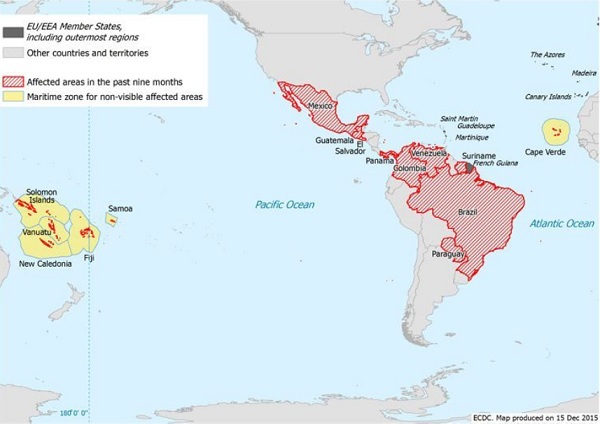
Luxembourg's Ministry of Health has issued a warning to residents concerning the dangers of travelling to countries - mainly in Central and South America - which are experiencing a large-scale spread of the Zika (Aedes) virus.
The virus is transmitted via mosquito bites; initial symptoms that may not seem that serious include high temperature, joint pain, muscle pain, skin redness, red eyes; as well as vomiting, headache, pain behind the eyes. There is no treatment against this disease and no vaccine available. The disease is self-limiting after a few days.
Zika can be responsible for malformations of the central nervous system of embryos (microcephaly) in pregnant women. The countries currently concerned include: Brazil, Cap Cerde, Colombia, El Salvador, Fiji, Guatemala, Mexico, New Caledonia, Panama, Paraguay, Samoa, Solomon Islands, Surinam, Vanuatu and Venezuela.
Travellers to these countries are urged to take individual preventative measures protecting against mosquito bites (inside and outside), especially from sunrise to sunset when mosquitoes bite more:
- Use a repellent respecting the instructions given on the product label. It is not recommended to use a repellent containing DEET for children aged under three months, but pregnant women can use it.
- Wear long-sleeved shirts and trousers, especially at times when the mosquito carrier of Zika is the most active.
- sleep or relax in rooms that are air-conditioned; otherwise, use mosquito nets, even during the day.
- Pregnant women and travellers with immune disorders or severe chronic illnesses or who are accompanied by young children should consult their doctor or seek advice from a travel clinic before departing on travel to obtain recommendations on the use of repellents and other preventive measures.
- Travellers with symptoms matching those of the Zika virus infection in the three weeks following their return from infected areas are advised to contact their doctor and inform them of their recent trip.
In addition, pregnant women who have traveled in areas affected by the Zika virus should mention their travel so that their antenatal care to be reviewed and monitored appropriately.








